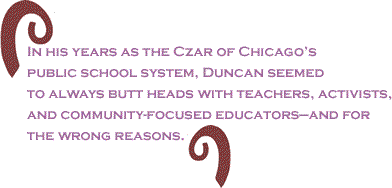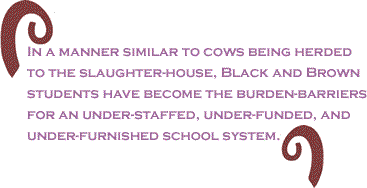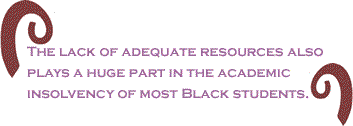
|
|||||||||||||||||||||||
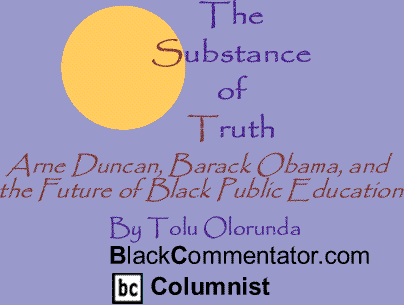
|
|

Custom Search
|
|
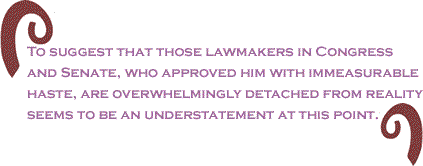 |
|
Who could have imagined that Arne Duncan—yep!, the one with the Bachelor’s in Sociology—Obama’s choice for Secretary of Education, would be welcomed by unanimous approval from Washington’s decision-makers? As King Duncan strolled down the Senate floor on January 13, no one could have predicted the amount of acclamation they had in store for him. As the lawmakers saw it, Duncan, “the best” man for the job; the “guy” who, unlike other activist-oriented educators, actually “gets it,” is the magic wand the public school system so desperately needs. “Go Obama,” another would exclaim! The results Duncan produced, in his years as Superintendent of Chicago Public Schools, you wonder? Oh, merely managing to worsen the drop-out and literacy rate of the students, militarizing inner-city public school districts, deepening the segregation of the school system, shutting down schools which didn’t meet the “standards” set by state officials, mass-firing of teachers (sometimes, entire school staff) whose students didn’t perform acceptably on standardized tests, and tearing down public schools to build charter schools in lieu of them—you know, the usual. To suggest that those lawmakers in Congress and Senate, who approved him with immeasurable haste, are overwhelmingly detached from reality seems to be an understatement at this point. As Author Greg Palast noted, following the President’s selection of Duncan last December, Obama, while a State Senator, so much distrusted Duncan’s capabilities that he “was one of the only local Chicago officials who refused to send his kids to Duncan's public schools.” As Palast sees it, Duncan’s esteemed educational qualifications lies not in any credible work performed, but in his role as, “Obama's pick-up basketball buddy from Hyde Park.” If this is true, as clear-thinking suggests it is, Arne Duncan—the No Child Left Behind advocate, the sweet-talker, the school-privatization activist—is a man worthy of staunch opposition. In this sense, public school activists in Chicago might have some lessons to teach the national community.
In his years as the Czar of Chicago’s public school system, Duncan seemed to always butt heads with teachers, activists, and community-focused educators—and for the wrong reasons. Chicago-based teacher, Jesse Sharkley, recently reported of the tumultuous battles waged, in past times, between Duncan and the school-activist community in Chicago. Sharkley writes that Duncan, like Obama, was born “with a style that made it seem like he was listening”—without actually taking into consideration the concerns of the people. He, in Sharkley’s words, is “just the kind of person who will look at you with a straight face and tell you that, as a person with a pacifist background, he supports a military school.” With a collective focus and a unified voice, however, they were able to force Duncan to swing by the school districts he presided over, but hardly visited. The national coalition of school-centered activists can learn a thing or two about Duncan’s chameleon personality—a skill he certainly picked up from his many ball-games with the President. The double-face, double-talk style—which worked successfully in the ’08 Presidential Race—seems to be a criterion for public office these days. Kevin Martin, the out-gone FCC chairman, was a veteran in this playing field. With the kind of unaffordable sophistry new-age politicians possess, the challenges of helping people see beyond the bland façade of rhetoric mounts even higher. It also becomes a pattern of confusion when the same man, who “won’t back up one bit” from asking that Black folks take more “personal responsibility” for their actions, would appoint, as the next head of the national public school system, one with no academic qualifications whatsoever. This line of reasoning is, perhaps, what explains Obama’s comments, late last week, that Washington schools need some “flinty Chicago toughness,” and the best way to achieve that is by forcing children to go to school in the middle of ice-cold weather and blizzard storms—just like Daley would want. Such off-the-cuff, but telling, remarks like that validate the adage that “many a truth is oft told in jest.” For far too long, Black and Brown students have been used as fodder for the public/private school system. In a manner similar to cows being herded to the slaughter-house, Black and Brown students have become the burden-barriers for an under-staffed, under-funded, and under-furnished school system. With schools, across the country, investing more money in metal detectors and security equipments, than textbooks and literacy initiatives, it’s no wonder the graduation rates of Black and Brown students are placed at 50 % and 53 %, respectively. The sobering statistics are very telling of what level, on the priority scale, administrators and superintendents place children. Acclaimed educator and the author of three award-winning books, Dr. Janice Hale, is convinced that the educational system, as a construct, was structured to carry out a political agenda—the disenfranchisement of Black people—and is therefore corrupted in its roots.
Dr. Hale believes that the problem with the educational system today is “the fundamental problem of capitalism—the survival of the fittest [mentality].” Dr. Hale contends that “public education was not really created with Black people in mind. It was created for White children.” She makes the comparison between the days when Black parents’ tax dollars were being used to educate white children—with a legal system in place that disallowed Black children from schooling, and a de-facto system today, that essentially promotes the same premise. This game of “hide and seek,” where the state creates “ever escalating standards” for Black students, is, as Dr. Hale sees it, intentionally set up to ensure that Black children “are not given the resources to meet those standards.” The gates [of opportunity] are being locked,” she says. Another problem is that “we don’t have parents who are connected to the culture of power; parents who understand the code of power—where they can keep up with the hide and seek [game being played].” Dr. Hale also notes that single-parent families—disproportionately Black and female-headed—cannot be expected “to know how to go into those schools and transform them.” She believes that “when they [the school system] stop blaming the victim, and begin the process of crafting schools for children whose parents are illiterate,” things would inevitably change for the better. The lack of adequate resources also plays a huge part in the academic insolvency of most Black students, according to Dr. Hale. “[The provision of] financial resources is crucial, because the parents who are connected to the culture of power can provide opportunities for their children, which inner-city parents cannot generate,” she says. When it comes to the chain of command, Dr. Hale affirms that the state is responsible for meeting the educational needs of Black children. It has the “fiduciary responsibility and obligation to provide [equitable] education” to Black students. Another cause of concern is the “method” of allocating funds to schools, says Dr. Hale. The way the system is structured, schools whose teachers have less seniority receive less funding than those with more-experienced teachers. Because most inner-city school teachers belong to the first category, this supposedly “fair rationale,” only perpetuates the cycle of academic death in the Black Community. To fight this system effectively, Dr. Hale is convinced that certain factors must be at work in our struggle. One is the issue of leadership. “We need leadership from the Black intelligentsia,” she says. “People are ready to make some noise and make a difference.” Dr. Hale takes the example of her Institute, ISAAC, which started with no corporate funding, but has been blessed with the passion of educators and activists who simply want to be a part of the sea of change that is gathering to “make some noise,” about the unacceptable levels of illiteracy in the Black community. As she put it, people only need someone willing to “lead the way,” for them to “step up,” and rise to the occasion.
The future of the Black education depends on the leadership-initiatives, and courageous steps taken by all those interested in the success of Black children, Dr. Hale contends. It wouldn’t happen by the replacement of public schools with charter schools or “voucher systems,” she says. Those who advocate for alternative models are simply “trying to get around the concept of extending a quality education to everyone.” It’s a “best, bright, and lucky” cast system, she says. This model, Dr. Hale suggests, impinges upon the creed that “every single person is entitled to, and must have, a quality education.” She also argues that “the data on most of them [charter schools] shows that they perform worse than Public Schools.” What Black leaders must do is “create models that will transform public education,” for Black students across the country, she says. When asked what the ultimate prize is, Dr. Hale paraphrases fellow educator, V.P. Franklin: “Educational influence for African-American children, to propel them to their rightful position of excellence and leadership in the world.” What Dr. Hale understands, which very few educators are willing to confront, is the reality that every child is not only educable, but also possesses within him or her, the ability to imagine a world beyond the confines of our physical realm. Unless this gift is harnessed and cultivated, most students would ultimately lose sight of their innately exceptional mind, and adopt a narrow thinking-style liberally offered to them by the school, the home, the community, and the church/mosque/synagogue/temple body. In the words of distinguished professor Bill Ayers, “All children and youth in a democracy, regardless of economic circumstance, deserve full access to richly-resourced classrooms led by caring, qualified and generously compensated teachers. So let's push for that, and let's make it happen before Arne Duncan or anyone else grants us permission.” To find out more about the Institute for the Study of the African-American Child (ISAAC), pls. visit: http://www.coe.wayne.edu:16080/isaac/isaacsite/index.html http://www.coe.wayne.edu:16080/isaac/isaacsite/workingpapers.html http://www.coe.wayne.edu:16080/isaac/isaacsite/events.html BlackCommentator.com Columnist, Tolu Olorunda, is an 18-year-old local activist/writer and a Nigerian immigrant. Click here to reach Mr. Olorunda. |
|
Any BlackCommentator.com article may be re-printed so long as it is re-printed in its entirety and full credit given to the author and www.BlackCommentator.com. If the re-print is on the Internet we additionally request a link back to the original piece on our Website. Your comments are always welcome. eMail re-print notice
If you send us an eMail message we may publish all or part of it, unless you tell us it is not for publication. You may also request that we withhold your name. Thank you very much for your readership. |
|
| |
|
| February
5, 2009 Issue 310 |
|
| Executive Editor: Bill Fletcher, Jr. |
| Managing Editor: Nancy Littlefield |
| Publisher: Peter Gamble |
| Est. April 5, 2002 |
Printer Friendly Version
in resizeable plain
text format or pdf
format. |
| Frequently Asked Questions |
 |

|
 |
 |
 |
| |
| |





























